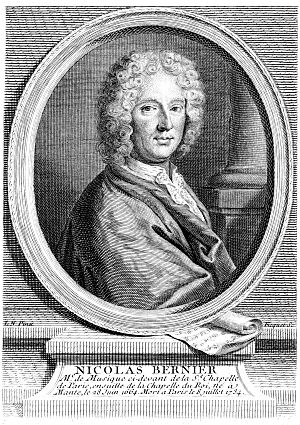Nicolas Bernier facts for kids
Nicolas Bernier (born June 28, 1664 – died September 5, 1734) was a talented French composer from the Baroque period. He was known for mixing French and Italian musical styles. Bernier taught music and wrote many different kinds of pieces, including songs for voices and instruments.
Contents
About Nicolas Bernier
Nicolas Bernier was born in Mantes-sur-Seine, a town now called Mantes-la-Jolie, in France. His parents were Rémy Bernier and Marguerite Bauly. He learned music from a teacher named Antonio Caldara. This helped him develop a special style that blended French and Italian music.
Early Career and Teaching
Bernier likely started his music studies at church schools in Mantes and Evreux. By 1692, he was living in Paris and teaching how to play the harpsichord. He became the head of the music school at Chartres Cathedral in 1694. Later, in 1698, he took a similar job at St Germain-l'Auxerrois in Paris.
Royal Musician
In 1700, a special musical piece he wrote, called a "Te Deum," was performed for the king. It was very popular! Because of his success, Nicolas Bernier took over from Marc-Antoine Charpentier in 1704. He became the "master of choristers" (maître de musique des enfants) at the royal Sainte-Chapelle in Paris. This was a very important job, teaching and leading the choirboys.
Bernier had to follow a rule at the Sainte-Chapelle that said the music master should be single. However, he married Marie-Catherine Marais in 1712. Thanks to the support of a powerful person, Philippe, Duke of Orléans, Bernier was able to keep his job. He stayed at the Sainte-Chapelle until 1726.
In 1723, Bernier also became one of the assistant music masters for the Chapelle Royale, another royal music group. He was in charge of teaching the young pages (students) there until 1733. Bernier was famous as a teacher. He even wrote a book called Principes de composition (Principles of Composition) about how to write music. One of his well-known students was Louis-Claude Daquin.
Bernier's Musical Style
Nicolas Bernier was special because he found a way to combine the French and Italian styles of music. He was one of the first composers to create a type of music called "French cantatas." These were like mini-operas for one or two singers, telling a story through music.
His music often featured strong singing parts and special sections called "da capo airs." These pieces had a clear, expressive melody that sounded very French. Bernier also wrote instrumental music, like dances and overtures, which were influenced by Italian styles. He was also known for his skill in writing "counterpoint," which is when different musical lines weave together beautifully.
Bernier's Musical Works
Nicolas Bernier wrote many different types of music. Most of his printed works were published in Paris.
Sacred Vocal Music
This type of music was written for church services.
- Motets: Bernier wrote many motets, which are pieces for one, two, or three voices with musical accompaniment. He published two main collections of these in 1703 and 1713.
- Grands Motets: These were larger pieces for a choir (SATBB means Soprano, Alto, Tenor, Bass, Bass) and string instruments. Some of his famous grands motets include Beatus vir and Confitebor tibi Domine.
- Leçons de Ténèbres: These were special songs for solo voice, often sung during Holy Week.
Secular Vocal Music
This music was written for entertainment outside of church.
- French Cantatas: Bernier was a pioneer in this style. He published several books of French cantatas, which were chamber music pieces for one or two voices with instruments. Some of these collections include Les nymphes de Diane and Les nuits de Sceaux.
- Airs: He also wrote shorter songs called "airs" that appeared in various collections of the time.
Music Theory Writing
Bernier wrote a very important book called Principes de composition de Mr Bernier (Principles of Composition by Mr. Bernier). This book explained how to compose music, especially focusing on how two different musical lines could work together. It showed his deep understanding of music theory.
See also
 In Spanish: Nicolas Bernier para niños
In Spanish: Nicolas Bernier para niños
 | DeHart Hubbard |
 | Wilma Rudolph |
 | Jesse Owens |
 | Jackie Joyner-Kersee |
 | Major Taylor |


